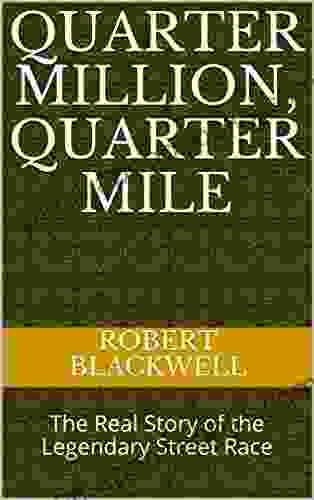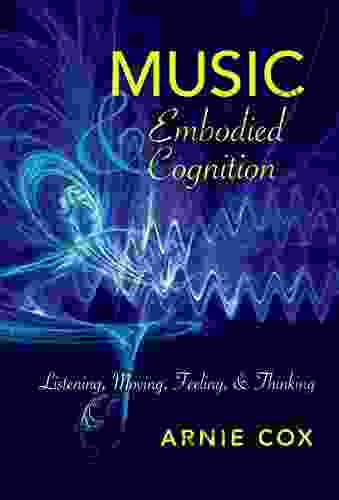Music and Embodied Cognition: Unlocking the Mind-Body Connection

Music is an integral part of human life. It transcends cultural boundaries, bringing people together through its universal language. While we may appreciate the emotional and aesthetic qualities of music, recent research in embodied cognition has revealed a deeper connection between music and the human body. Music can directly influence our thoughts, feelings, and physical well-being, challenging our understanding of how the mind and body interact.
5 out of 5
| Language | : | English |
| File size | : | 4272 KB |
| Text-to-Speech | : | Enabled |
| Screen Reader | : | Supported |
| Enhanced typesetting | : | Enabled |
| Word Wise | : | Enabled |
| Print length | : | 167 pages |
| Lending | : | Enabled |
What is Embodied Cognition?
Embodied cognition is a groundbreaking theory that proposes that our cognition is not solely confined to the brain but is deeply rooted in our physical experiences. According to this theory, the brain, body, and environment are interconnected, influencing each other in a constant feedback loop. This means that our physical experiences, including music, shape how we think, feel, and act.
Music and Embodiment
Music has a profound impact on our bodies. When we listen to music, our brains activate motor areas, indicating that we are simulating the movements we hear. This phenomenon, known as musical motion imagery, suggests that music can activate neural pathways associated with physical movement.
Furthermore, music can affect our heart rate, breathing, and muscle tension. Upbeat and rhythmic music can energize us, while slower and more contemplative music can promote relaxation. This shows that music can directly influence our physiological responses, connecting our auditory experiences with our physical reactions.
Implications for Music Education
The insights gained from embodied cognition have significant implications for music education. Traditional methods may focus on developing technical proficiency and theoretical knowledge. However, understanding the embodied nature of music could transform teaching and learning.
By incorporating embodied practices, such as movement and body awareness, into music education, we can enhance students' musical experiences. Movement-based activities allow students to connect with the physicality of music, fostering a deeper understanding of rhythm, tempo, and dynamics. This holistic approach can support students' musical development and make music more accessible and engaging.
Music Therapy and Embodiment
Music therapy is a well-established field that utilizes music for therapeutic purposes. Embodied cognition provides a theoretical framework that deepens our understanding of how music can facilitate healing and well-being.
By engaging with music, individuals can process emotions, reduce stress, and improve their physical and cognitive abilities. Music therapists can incorporate embodied practices, such as drumming or guided imagery, to enhance the therapeutic effects of music, creating a holistic approach to healing.
Music Performance and Embodiment
Professional musicians also benefit from an understanding of embodied cognition. When performing, musicians must coordinate their bodies, minds, and instruments in a seamless and expressive manner. By recognizing the embodied nature of performance, musicians can optimize their technique, enhance their stage presence, and evoke a stronger emotional connection with their audience.
Future Directions and Applications
The field of music and embodied cognition is in its early stages of development, with ongoing research exploring the diverse applications of this theory. Future research could investigate:
- The use of music for pain management and rehabilitation - The role of music in creativity and innovation - The potential of music to promote social cohesion and empathy
The emerging field of music and embodied cognition offers a transformative understanding of the mind-body connection. By recognizing the profound impact of music on our bodies, we can harness its power for education, therapy, performance, and beyond. As research continues to uncover the intricate relationship between music and the human body, we unlock limitless possibilities for using music to enhance our lives and well-being.
5 out of 5
| Language | : | English |
| File size | : | 4272 KB |
| Text-to-Speech | : | Enabled |
| Screen Reader | : | Supported |
| Enhanced typesetting | : | Enabled |
| Word Wise | : | Enabled |
| Print length | : | 167 pages |
| Lending | : | Enabled |
Do you want to contribute by writing guest posts on this blog?
Please contact us and send us a resume of previous articles that you have written.
 Book
Book Novel
Novel Page
Page Chapter
Chapter Text
Text Story
Story Genre
Genre Reader
Reader Library
Library Paperback
Paperback E-book
E-book Magazine
Magazine Newspaper
Newspaper Paragraph
Paragraph Sentence
Sentence Bookmark
Bookmark Shelf
Shelf Glossary
Glossary Bibliography
Bibliography Foreword
Foreword Preface
Preface Synopsis
Synopsis Annotation
Annotation Footnote
Footnote Manuscript
Manuscript Scroll
Scroll Codex
Codex Tome
Tome Bestseller
Bestseller Classics
Classics Library card
Library card Narrative
Narrative Biography
Biography Autobiography
Autobiography Memoir
Memoir Reference
Reference Encyclopedia
Encyclopedia Mimi Dietrich
Mimi Dietrich Michael Checchio
Michael Checchio Martina Mars
Martina Mars Michael Edmonds
Michael Edmonds Toni Mcclintock
Toni Mcclintock Mike Kleba
Mike Kleba Navana Kundu
Navana Kundu Natasha Lunn
Natasha Lunn Michael Coren
Michael Coren Michael Ball
Michael Ball Samuel Peralta
Samuel Peralta Roz Southey
Roz Southey Randy Bobbitt
Randy Bobbitt Mick Mercer
Mick Mercer Nate Procrasti
Nate Procrasti Rada Jones Md
Rada Jones Md Thomas E Keefe
Thomas E Keefe Melanie Magidow
Melanie Magidow Marta Dyczok
Marta Dyczok Richard K Scher
Richard K Scher
Light bulbAdvertise smarter! Our strategic ad space ensures maximum exposure. Reserve your spot today!

 Fyodor DostoevskyUnveiling the Adrenaline-Pumping True Story: "The Real Story of the Legendary...
Fyodor DostoevskyUnveiling the Adrenaline-Pumping True Story: "The Real Story of the Legendary... Herman MitchellFollow ·2.5k
Herman MitchellFollow ·2.5k Ruben CoxFollow ·15.4k
Ruben CoxFollow ·15.4k Phil FosterFollow ·6.4k
Phil FosterFollow ·6.4k Josh CarterFollow ·3k
Josh CarterFollow ·3k Langston HughesFollow ·9.6k
Langston HughesFollow ·9.6k Brayden ReedFollow ·11.3k
Brayden ReedFollow ·11.3k Jonathan FranzenFollow ·16.2k
Jonathan FranzenFollow ·16.2k Leslie CarterFollow ·2.9k
Leslie CarterFollow ·2.9k

 Ben Hayes
Ben HayesJourney into the Verdant Realm of "Plants vs. Zombies:...
Immerse Yourself in an Epic Battle for...

 Edward Reed
Edward ReedUnveiling the Allure of Modish Crochet Hats Annie...
In the realm of fashion and...

 Jaylen Mitchell
Jaylen MitchellHalf Moon Bay: An Unforgettable Adventure Awaits in Aj...
Prepare yourself...

 Dan Brown
Dan BrownUnleash the Plant-Powered Apocalypse: Dive into Paul...
Prepare yourself for an epic showdown where...

 Efrain Powell
Efrain PowellStolen Summer: Nora Sommer's Enthralling Caribbean...
Escape to a World of...

 Steven Hayes
Steven HayesPlants vs. Zombies: Lawnmageddon - The Ultimate Battle...
Prepare for the ultimate battle between plants...
5 out of 5
| Language | : | English |
| File size | : | 4272 KB |
| Text-to-Speech | : | Enabled |
| Screen Reader | : | Supported |
| Enhanced typesetting | : | Enabled |
| Word Wise | : | Enabled |
| Print length | : | 167 pages |
| Lending | : | Enabled |










